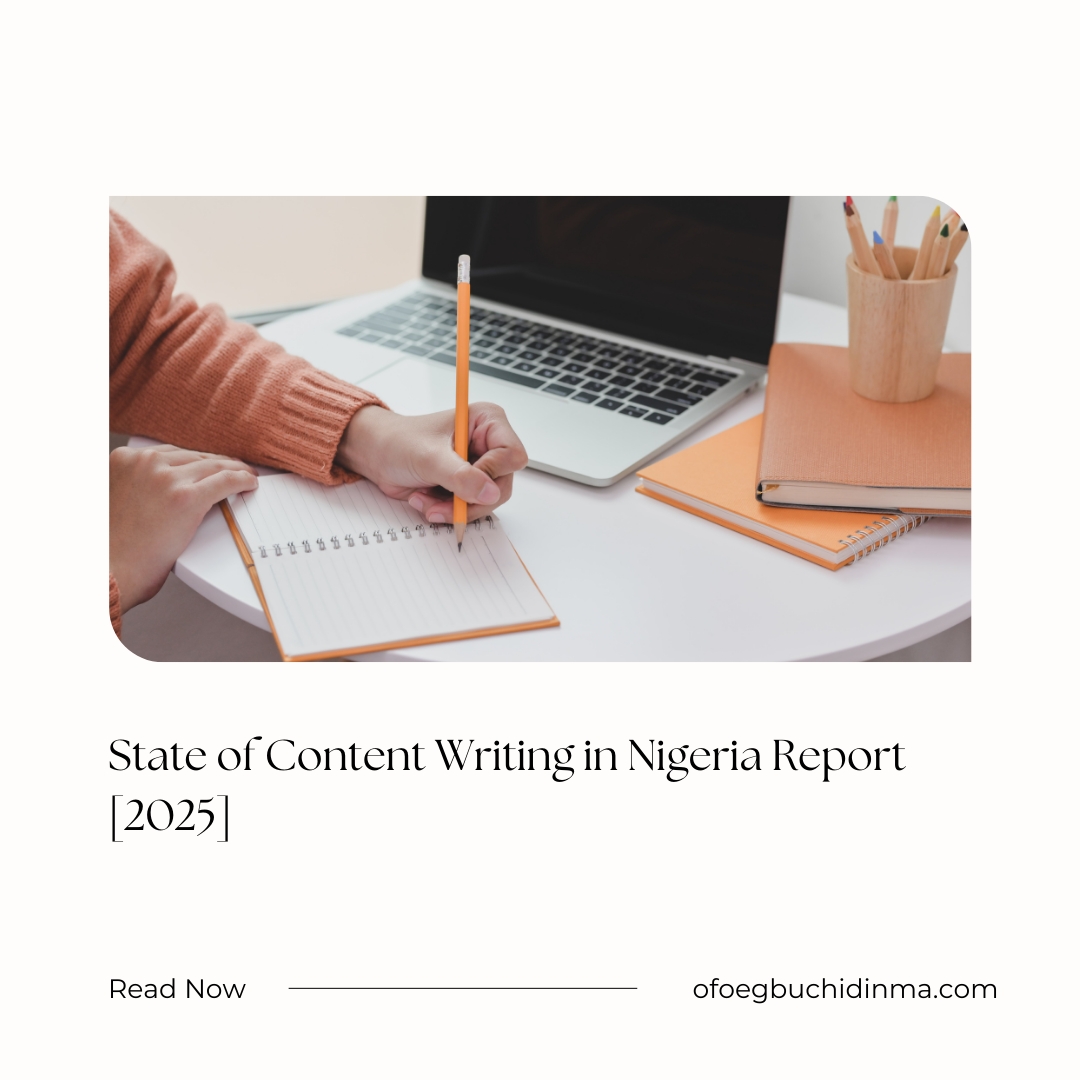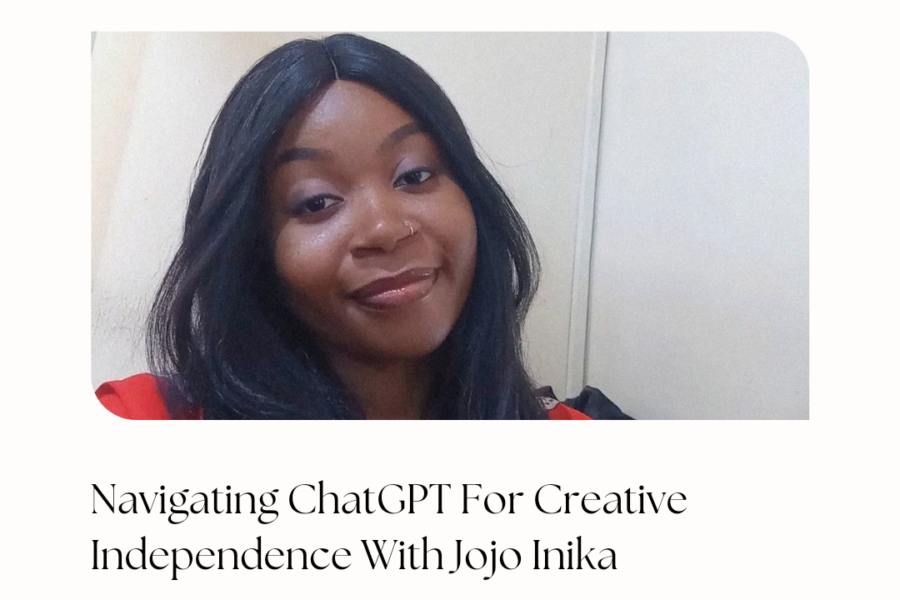Many people who know me as a freelance writer often ask, “Is content writing profitable?”
At the start of my journey as a freelance writer, the answer was always a resounding YES.
However, as the market became increasingly saturated and with the growing influence of AI, I started to notice shifts.
Instead of relying on guesswork, I decided to take a data-driven approach to answer this question. But I didn’t do this alone.
With the help of my friends—Sandra Tabansi, a content & social media strategist, and Miracle Ajoku, a data scientist & researcher—we brought this idea to life.
We surveyed 103 successful freelance writers in Nigeria to uncover insights into what’s working, what’s not, and how to navigate this industry.
As Sandra Tabansi put it after reviewing the results:
“Content writing is still a good career to venture into in 2025. Yes, the barrier to entry is a bit higher than normal because the market is saturated and competitive, and you need extra skills to thrive.
But if you focus on being excellent in high-paying sectors like SaaS, Tech, Finance, and E-commerce, there’s a big possibility of making 1M – 5M monthly.”
Want the full tea? Let’s dive into the results.
First Things First: Who Runs the Content Writing World?
Women. Yep, a whopping 65% of Nigerian content writers are female.
Why? Content writing offers flexible work, which is great for women, especially in places where they juggle both work and home responsibilities.
Plus, the creative and communication skills needed in this field often match the ones women are traditionally encouraged to develop.
![Gender Representation of Content Writers - State of Content Writing in Nigeria Report [2025]](https://ofoegbuchidinma.com/wp-content/uploads/2025/02/3-1024x1024.png)
And where’s the action happening? Lagos leads with nearly 39% of content writers based there.
Port Harcourt and Abuja trail behind, with emerging hubs like Ibadan and Akwa Ibom slowly making their marks.
![Geographical Distribution of Content Writers - State of Content Writing in Nigeria Report [2025]](https://ofoegbuchidinma.com/wp-content/uploads/2025/02/4-1024x1024.png)
Demographics
The industry is young—literally.
87.4% of Nigerian content writers are between 18-30 years old. It makes sense: young people are tech-savvy and willing to adapt to new tools and trends.

Also, most writers hold a bachelor’s degree (79%), and only about 11% of content writers in Nigeria have a master’s degree.

This shows that most people in the field have at least a university education, which makes sense since content writing is a digital job that needs a good level of literacy and tech skills.
What Kind of Content Do They Create?
Most respondents create blog posts (93.2%), followed by website copy (68.9%), social media content (53.4%), and email newsletters (36.9%).
They also work on other content types like whitepapers, case studies, proposals, video scripts, thought leadership pieces, corporate speeches, and biographies.
Show Me The Money: Earnings and Industries That Pay
For most writers, monthly earnings fall between ₦200,000 and ₦500,000.
However, a lucky 13% rake in more than ₦2 million monthly. The secret? Experience, killer portfolios, and strategic positioning.
According to the results, the largest causative for higher earnings is experience. Writers with more experience earn higher, while those with less than 2 years earn lower.
![Income Distribution Among Nigerian Content Writers - State of Content Writing in Nigeria Report [2025]](https://ofoegbuchidinma.com/wp-content/uploads/2025/02/7-1024x1024.png)
Most content writers (40%) work with both local and international clients, followed by those serving Nigerian companies (32%) and only international clients (28%). Writers focusing solely on international clients earn over ₦2 million monthly.
Industries That Pay
When it comes to industries, these are the ones with more profit potential monthly:
- SAAS: Writers earn an average of ₦1.31 million.
- Technology: Writers earn an average of ₦1.22 million.
- Finance: Writers earn an average of ₦1.0 million.
- E-commerce: Writers earn an average of ₦1.03 million.
- Cryptocurrency/Web3: Writers earn an average of ₦962,963.
- Education: Writers earn an average of ₦565,217.
- Healthcare: Writers earn an average of ₦600,000.
![Average Income Analysis Across Industries - State of Content Writing in Nigeria Report [2025]](https://ofoegbuchidinma.com/wp-content/uploads/2025/02/8-1-1024x1024.png)
How Are These Writers Getting Clients?
The data shows that the most effective ways to find clients are through social media and referrals. LinkedIn, which is essentially another form of social media, also plays a big role in getting clients.
![Client Acquisition Breakdown - State of Content Writing in Nigeria Report [2025]](https://ofoegbuchidinma.com/wp-content/uploads/2025/02/9-1024x1024.png)
Other comments include:
- “Doing the best possible work for the first client. It serves as a strong foundation for everything else: the referrals, pitching your work to other clients, etc.”
- “Putting myself out there. Let your work show you’re a writer by writing and contributing to other people’s content.”
- “Pitching.”
- “Google searches on Nairaland”
- “Targeting booming industries and identifying gaps I can fill.”
- “Value. Most clients I get start off the conversation with ‘I saw X and X in your portfolio and was really impressed.’ The work mostly speaks for itself, and I’m grateful for devoting most of my career to putting out high-quality content. Also, access to COMMUNITY cannot be overstated, as some of my highest-paying roles have come from direct referrals.”
- “The most effective strategy I’ve had is connecting with folks in content marketing leadership positions (in companies that I’d love to work with) and sending in my portfolio/cover letter/application whenever they post that they’re hiring writers. That was how I landed HubSpot (which I followed up with for over 5 months before getting the job), Thinkific, and AdEspresso.”
While the number of workdays doesn’t seem to impact how writers find clients, focusing on social media and referrals seems to be the most efficient strategy for getting new clients.
The Tools of the Trade: AI and Digital Platforms
ChatGPT (36%) and Grammarly (36%) are the most popular AI tools in the Nigerian content writing space.

They’re mainly used for content generation and editing. Tools like Claude AI and Quillbot are also gaining traction, while Jasper and Copy AI are used less often.
The writers shared that AI is mostly used for idea generation and editing while writing first drafts is a secondary use.
The Not-So-Glamorous Side of Content Writing
The biggest challenge for Nigerian content writers is finding high-paying clients, according to 35.32% of respondents.
Other common struggles include market saturation and meeting deadlines while keeping quality high, both at 15.32%.
Payment issues and connectivity problems also affect a significant portion of writers, at 10.21% and 9.79%, respectively. AI competition and tech challenges were less of a concern, each making up 5.11% and 3.83%.
Smaller issues like skill gaps, niche job searches, and logistical problems were mentioned by a few writers as well.
![Challenges Faced by Nigerian Content Writers - State of Content Writing in Nigeria Report [2025]](https://ofoegbuchidinma.com/wp-content/uploads/2025/02/11-3-1024x1024.png)
Which Skills are Opening Doors?
Over the past two years, the most in-demand skills in content writing have been:
- AI proficiency
- SEO
- Content strategy
- Data analysis
These skills are key for keeping up with industry changes, as there’s a growing reliance on AI and SEO optimization.
![DNA Blueprint for Content Mastery - State of Content Writing in Nigeria Report [2025]](https://ofoegbuchidinma.com/wp-content/uploads/2025/02/12-1024x1024.png)
Chima Mmeje, Senior Content Marketing Manager at Moz, explains that it’s important to learn how to integrate AI into your workflow:
“If you can figure out how to offer clients more efficiency while maintaining quality levels, they’ll be willing to pay for your services. More teams look for ways to incorporate AI into their processes.”
Looking Ahead: Where’s the Industry Headed?
The analysis shows that about 58% of people would choose content writing as a career if they were starting today. Around 27% are unsure about it, while 15% don’t see it as a good option.

This suggests that, despite challenges like inconsistent income, content writing is still a popular career choice for many, though some hesitate due to concerns or unmet expectations.
Industries we’re likely to see more growth and opportunities, according to the respondents:
- Web3
- SaaS
- Finance
- Fintech
- AI (Artificial Intelligence)
- Tech
- Healthcare
- E-commerce
- Cybersecurity
- Crypto.
How Can the Writing Community Grow in Nigeria?
To help the writing community grow, it’s important to collaborate more, offer training programs, and create spaces for writers to share knowledge. That way, everyone can level up together!
Other comments include:
- “More collaboration, more documentation, and more emphasis on doing good work. There’s so much info about personal branding out there that we can forget that doing good work often matters more.”
- “Provision of tools that are Nigerian-made, so it isn’t expensive to access like SEMrush and co.”
- “Developing job boards and platforms to connect Nigerian writers with local and international opportunities is essential for growth. Recognition of local talent through awards and features can inspire more people to pursue writing, while online communities offer a space for feedback and personal brand-building. Encouraging content in local languages would also enrich the digital content space, preserving cultural heritage and expanding reach. By focusing on networking, training, and recognition, Nigeria’s content writing community can thrive.”
- “Hmmmm! We need to look out for each other more. I have seen some professionals and how tight-knit they are, sharing resources and gigs with each other. But in the writing community, one person is closing gigs endlessly, yet there is no avenue to share how it is done, either paid or free, with others. And sometimes when they do share, it’s fluff—no substance in what is shared. I could as well have Googled if I needed such half-baked information or asked on Quora.”
- “Earlier this year, the FCDC organized a meetup, which I attended. I was able to connect with several Nigerian content writers and marketers, whom I talk to regularly and can call friends today. I think the content writing community in Nigeria can benefit from more events like that one.”
- “Salary transparency, mostly. That will genuinely stop a lot of writers from undercharging and might even help Nigerian companies rate us better.”
- “We need more transparency like the foreigners do with their communities.”
- “Solid training for the niches.”
- “It can be strengthened when everyone has a give, rather than take, mentality. When you join a community, look for ways to give more than you take.”
- “Collaboration.”
- “By OGs sharing resources they used to grow.”
Is Content Writing Profitable in Nigeria?
YUP! Content writing is profitable in Nigeria! It’s also important to note that the key to success in this field is a mix of consistently creating content, growing your skills, and networking.
Professionals in the industry recommend that writers keep learning, stay updated with SEO, and make the most of AI tools.
We asked John Iwuozor, a cybersecurity content marketer who made over $100k in 2024 as a freelance writer in Nigeria for his thoughts. He shared:
“You can make a living with content writing in 2025, especially if you’re very good at what you do. Companies still value quality content for SEO and brand building, and they’re happy to pay well for writers who can deliver thoughtful, well-researched work that AI can’t match.
Rather than competing with hundreds of others on Upwork and Fiverr, more writers are now sharing their knowledge on LinkedIn, writing about their areas of expertise, and working directly with top clients. It turns out that when you understand your subject matter (niche), there’s always work to be found.”
Advice to Newbie Content Writers
To succeed as a content writer, it’s essential to build a strong portfolio and personal brand from the start. Begin by networking with others in the industry, joining relevant communities, and seeking mentorship to accelerate your learning and growth.
Lily Ugbaja, Head of Content Marketing at Spicy Margarita, explains why joining communities is necessary if you want to grow faster:
“Join communities like The FCDC, Superpath, Top of the Funnel, etc. You’ll learn skills 1000% faster, find mentors, and learn to filter out BS too.”
Additionally, consistently improve your skills by mastering SEO, storytelling, and content strategy.
Lily also adds “Focus on working with agencies at first. Most have standardized processes and great editors who’ll help you improve fast with good feedback.”
As you progress, be proactive in seeking out projects and opportunities that align with your goals. At the same time, avoid distractions like AI noise and instead focus on refining your unique voice.
Ayomide Joseph A, a freelance B2B SaaS content writer and strategist, reminds newbie writers they’re not alone.
He said: “Log on to LinkedIn and you’ll see Lily Ugbaja discussing the applicability of her framework at some top companies.
You’ll see Chima Mmeje making you smile as she discusses marketing with Moz, and then there’s Stella Inabo championing her work at her company.
The names keep on running and it’s so beautiful to see because you know that if they can get to the top, then surely you can.”
Methodology
The State of Content Writing in Nigeria Report 2025 was conducted by Chidinma Ofoegbu, Sandra Tabansi, and Ajoku Miracle.
The survey was fielded between November 13th, 2024, and January 9th, 2025, drawing 103 responses from content writers in Nigeria across various industries.
The data was collected through a mix of online surveys and interviews, ensuring a diverse range of insights.
Respondents were asked to share their experiences, challenges, and strategies related to content writing, career growth, skill development, and personal branding.
This approach allowed for both qualitative and quantitative data, providing a comprehensive understanding of current trends in the content writing industry.
Thank you to the survey participants who made this research possible, the Smarketers community for assisting with distribution, and everyone else who helped disseminate the survey.







Leave a Comment